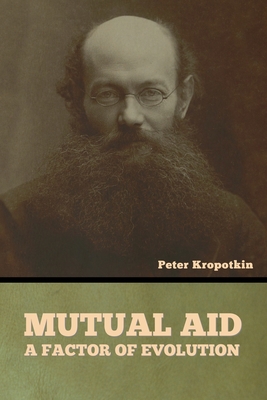Mutual Aid: A Factor of Evolution

Mutual Aid: A Factor of Evolution
Mutual Aid: A Factor of Evolution is a 1902 collection of anthropological essays by Russian naturalist and anarchist philosopher Peter Kropotkin. The essays, initially published in the English periodical The Nineteenth Century between 1890 and 1896, explore the role of mutually-beneficial cooperation and reciprocity (or "mutual aid") in the animal kingdom and human societies both past and present. It is an argument against theories of social Darwinism that emphasize competition and survival of the fittest, and against the romantic depictions by writers such as Jean-Jacques Rousseau, who thought that cooperation was motivated by universal love. Instead Kropotkin argues that mutual aid has pragmatic advantages for the survival of human and animal communities and, along with the conscience, has been promoted through natural selection. Mutual Aid is considered a fundamental text in anarchist communism. It presents a scientific basis for communism as an alternative to the historical materialism of the Marxists. Kropotkin considers the importance of mutual aid for prosperity and survival in the animal kingdom, in indigenous and early European societies, in the medieval free cities (especially through the guilds), and in the late 19th century village, labor movement, and poor folk. He criticizes the State for destroying historically important mutual aid institutions, particularly through the imposition of private property. Many biologists (including Stephen Jay Gould, one of the most influential evolutionary biologists of his generation) also consider it an important catalyst in the scientific study of cooperation. (wikipedia.org)
BIO: Pyotr Alexeyevich Kropotkin (December 9, 1842 - February 8, 1921) was a Russian activist, revolutionary, scientist, geographer and philosopher who advocated anarcho-communism. Born into an aristocratic land-owning family, he attended a military school and later served as an officer in Siberia, where he participated in several geological expeditions. He was imprisoned for his activism in 1874 and managed to escape two years later. He spent the next 41 years in exile in Switzerland, France (where he was imprisoned for almost four years) and in England. He returned to Russia after the Russian Revolution in 1917 but was disappointed by the Bolshevik form of state socialism. Kropotkin was a proponent of a decentralised communist society free from central government and based on voluntary associations of self-governing communiti
PRP: 135.51 Lei
Acesta este Prețul Recomandat de Producător. Prețul de vânzare al produsului este afișat mai jos.
121.96Lei
121.96Lei
135.51 LeiIndisponibil
Descrierea produsului
Mutual Aid: A Factor of Evolution is a 1902 collection of anthropological essays by Russian naturalist and anarchist philosopher Peter Kropotkin. The essays, initially published in the English periodical The Nineteenth Century between 1890 and 1896, explore the role of mutually-beneficial cooperation and reciprocity (or "mutual aid") in the animal kingdom and human societies both past and present. It is an argument against theories of social Darwinism that emphasize competition and survival of the fittest, and against the romantic depictions by writers such as Jean-Jacques Rousseau, who thought that cooperation was motivated by universal love. Instead Kropotkin argues that mutual aid has pragmatic advantages for the survival of human and animal communities and, along with the conscience, has been promoted through natural selection. Mutual Aid is considered a fundamental text in anarchist communism. It presents a scientific basis for communism as an alternative to the historical materialism of the Marxists. Kropotkin considers the importance of mutual aid for prosperity and survival in the animal kingdom, in indigenous and early European societies, in the medieval free cities (especially through the guilds), and in the late 19th century village, labor movement, and poor folk. He criticizes the State for destroying historically important mutual aid institutions, particularly through the imposition of private property. Many biologists (including Stephen Jay Gould, one of the most influential evolutionary biologists of his generation) also consider it an important catalyst in the scientific study of cooperation. (wikipedia.org)
BIO: Pyotr Alexeyevich Kropotkin (December 9, 1842 - February 8, 1921) was a Russian activist, revolutionary, scientist, geographer and philosopher who advocated anarcho-communism. Born into an aristocratic land-owning family, he attended a military school and later served as an officer in Siberia, where he participated in several geological expeditions. He was imprisoned for his activism in 1874 and managed to escape two years later. He spent the next 41 years in exile in Switzerland, France (where he was imprisoned for almost four years) and in England. He returned to Russia after the Russian Revolution in 1917 but was disappointed by the Bolshevik form of state socialism. Kropotkin was a proponent of a decentralised communist society free from central government and based on voluntary associations of self-governing communiti
Detaliile produsului










